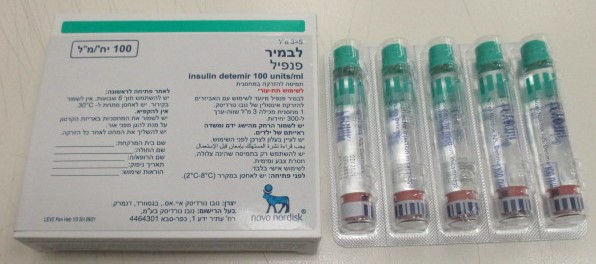Quest for the right Drug

לבמיר LEVEMIR (INSULIN DETEMIR)
תרופה במרשם
תרופה בסל
נרקוטיקה
ציטוטוקסיקה
צורת מתן:
תת-עורי : S.C
צורת מינון:
תמיסה להזרקה : SOLUTION FOR INJECTION
עלון לרופא
מינוניםPosology התוויות
Indications תופעות לוואי
Adverse reactions התוויות נגד
Contraindications אינטראקציות
Interactions מינון יתר
Overdose הריון/הנקה
Pregnancy & Lactation אוכלוסיות מיוחדות
Special populations תכונות פרמקולוגיות
Pharmacological properties מידע רוקחי
Pharmaceutical particulars אזהרת שימוש
Special Warning עלון לרופא
Physicians Leaflet
Adverse reactions : תופעות לוואי
4.8 Undesirable effects Summary of the safety profile Adverse reactions observed in patients using Levemir are mainly due to the pharmacologic effect of insulin. The overall percentage of treated patients expected to experience adverse reactions is estimated to be 12%. The most frequently reported adverse reaction during treatment is hypoglycaemia, please see section 4.8, Description of selected adverse reactions. From clinical investigations, it is known that major hypoglycaemia, defined as requirement for third party intervention, occurs in approximately 6% of the patients treated with Levemir. Injection site reactions are seen more frequently during treatment with Levemir than with human insulin products. These reactions include pain, redness, hives, inflammation, bruising, swelling and itching at the injection site. Most of the injection site reactions are minor and of a transitory nature, i.e. they normally disappear during continued treatment in a few days to a few weeks. At the beginning of the insulin treatment, refraction anomalies and oedema may occur; these reactions are usually of transitory nature. Fast improvement in blood glucose control may be associated with acute painful neuropathy, which is usually reversible. Intensification of insulin therapy with abrupt improvement in glycaemic control may be associated with temporary worsening of diabetic retinopathy, while long-term improved glycaemic control decreases the risk of progression of diabetic retinopathy. Tabulated list of adverse reactions Adverse reactions listed below are based on clinical trial data and classified according to MedDRA frequency and System Organ Class. Frequency categories are defined according to the following convention: Very common (≥1/10); common (≥1/100 to <1/10); uncommon (≥1/1,000 to <1/100); rare (≥1/10,000 to <1/1,000); very rare (<1/10,000); not known (cannot be estimated from the available data). Immune system disorders Uncommon – Allergic reactions, potentially allergic reactions, urticaria, rash, eruptions* Very rare – Anaphylactic reactions* Metabolism and nutrition Very common – Hypoglycaemia* disorders Nervous system disorders Rare – Peripheral neuropathy (painful neuropathy) Eye disorders Uncommon – Refraction disorders Uncommon – Diabetic retinopathy Skin and subcutaneous tissue Uncommon – Lipodystrophy* disorders Not known – Cutaneous amyloidosis*† General disorders and Common – Injection site reactions administration site conditions Uncommon – Oedema * see section 4.8, Description of selected adverse reactions. † ADR from post marketing sources. Description of selected adverse reactions Allergic reactions, potentially allergic reactions, urticaria, rash, eruptions Allergic reactions, potentially allergic reactions, urticaria, rash and eruptions are uncommon when Levemir is used in basal-bolus regimen. However, when used in combination with oral antidiabetic medicinal products, three clinical studies have shown a frequency of common (2.2% of allergic reactions and potentially allergic reactions have been observed). Anaphylactic reactions The occurrence of generalised hypersensitivity reactions (including generalised skin rash, itching, sweating, gastrointestinal upset, angioneurotic oedema, difficulties in breathing, palpitation and reduction in blood pressure) is very rare but can potentially be life threatening. Hypoglycaemia The most frequently reported adverse reaction is hypoglycaemia. It may occur if the insulin dose is too high in relation to the insulin requirement. Severe hypoglycaemia may lead to unconsciousness and/or convulsions and may result in temporary or permanent impairment of brain function or even death. The symptoms of hypoglycaemia usually occur suddenly. They may include cold sweats, cool pale skin, fatigue, nervousness or tremor, anxiousness, unusual tiredness or weakness, confusion, difficulty in concentrating, drowsiness, excessive hunger, vision changes, headache, nausea and palpitation. Skin and subcutaneous tissue disorders Lipodystrophy (including lipohypertrophy, lipoatrophy) and cutaneous amyloidosis may occur at the injection site and delay local insulin absorption. Continuous rotation of the injection site within the given injection area may help to reduce or prevent these reactions (see section 4.4). Paediatric population Based on post-marketing sources and clinical trials, the frequency, type and severity of adverse reactions observed in the paediatric population do not indicate any differences to the broader experience in the general diabetes population. Other special populations Based on post-marketing sources and clinical trials, the frequency, type and severity of adverse reactions observed in elderly patients and in patients with renal or hepatic impairment do not indicate any differences to the broader experience in the general population. Reporting of suspected adverse reactions Reporting suspected adverse reactions after authorisation of the medicinal product is important. It allows continued monitoring of the benefit/risk balance of the medicinal product. Any suspected adverse events should be reported to the Ministry of Health according to the National Regulation by using an online form https://sideeffects.health.gov.il

פרטי מסגרת הכללה בסל
התרופה תינתן לחולי סוכרת
מסגרת הכללה בסל
התוויות הכלולות במסגרת הסל
| התוויה | תאריך הכללה | תחום קליני | Class Effect | מצב מחלה |
|---|---|---|---|---|
| INSULIN GLARGINE | ||||
| סכרת |
שימוש לפי פנקס קופ''ח כללית 1994
לא צוין
תאריך הכללה מקורי בסל
15/04/2005
הגבלות
תרופה מוגבלת לרישום ע'י רופא מומחה או הגבלה אחרת
מידע נוסף
